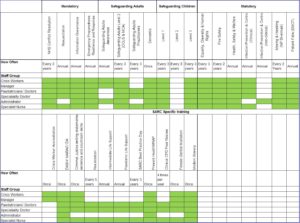We strongly believe that well trained and qualified staff are essential to providing an excellent service to women, men and children who have experienced rape or sexual assault. As such, we employ highly skilled specialist doctors and nurses and invest heavily in all areas of staff training and development.
Specialist Doctors
We believe that it is essential to have competent doctors to provide safe care for child complainants of alleged sexual abuse and assault. We therefore follow the fflm guidelines regarding quality standards.
As such all of our forensic medical examiners (FMEs) have had a least 3 years training in a relevant speciality, have attended an FFLM approved introductory training course in Paediatric Sexual Offence Medicine, have completed Intermediate Life Support training in the previous year, are up to date with Level 3 Child Protection training, have had training in statement writing and court room skills, have had training in equality and diversity issues and have LFFLM (SOM) which is a current qualification in sexual offences medicine. All of our doctors attend SARC best practice meetings every 3 years. All our doctors attend regular peer review, and complete at least 20 examinations per year to ensure that their skills are up to date.
Specialist Nurses
In addition to their medical training, our specialist nurses receive extra training for multi-agency risk assessment (MARAC) and domestic abuse, stalking and honour based violence (DASH), intermediate and paediatric life support training, adult and children safeguarding. They also receive training in statement writing and court room skills, female genital mutilation and modern slavery as well as regular peer review and SARC best practice.
Crisis Workers
Our crisis workers receive formal Crisis Worker Development training conducted by Lime Culture an accredited training provider. This makes sure that they have the competence and confidence to respond appropriately to vulnerable people and provide professional advice and support on the range of options available to them in the aftermath of a sexual assault. They are also trained in adult and child safeguarding, resuscitation, equality, diversity and human rights, as well as statement writing and court room skills, female genital mutilation and modern slavery.
Staff Training Matrix

